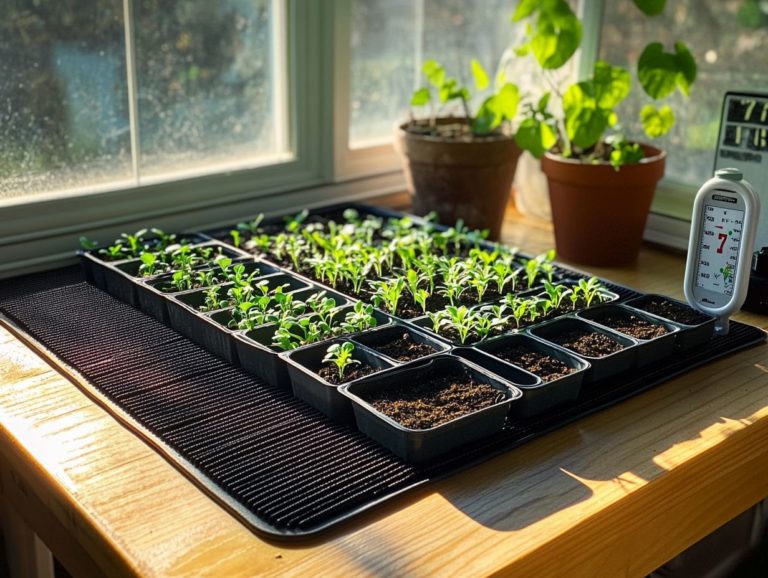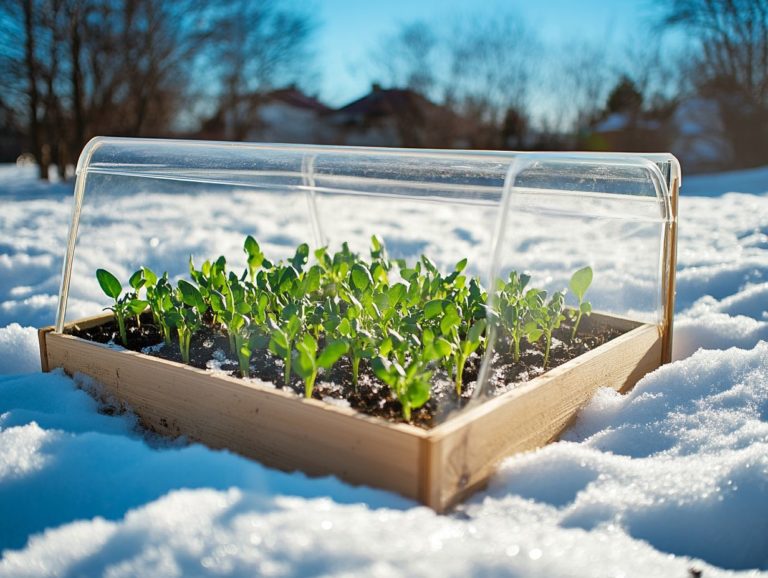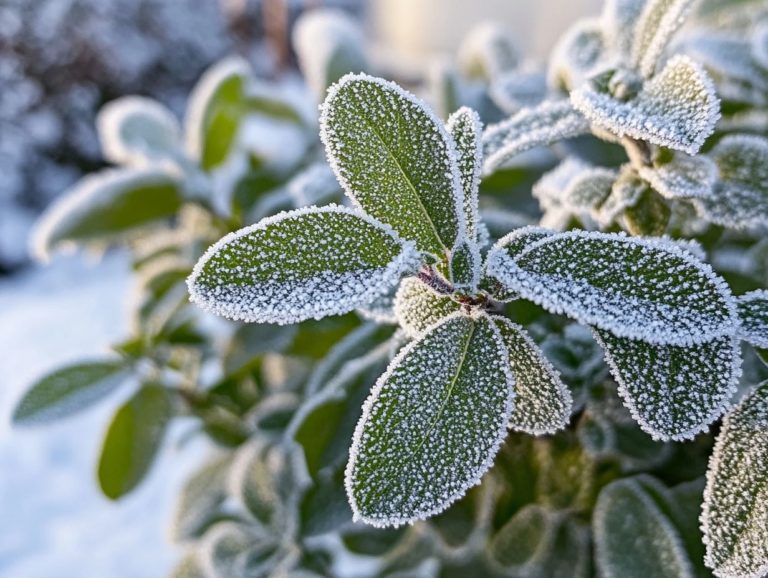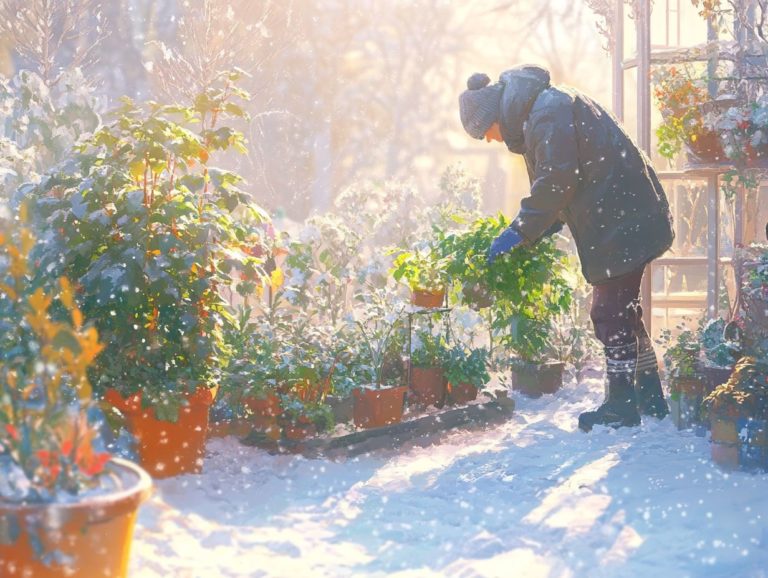Navigating Seasonal Changes in Winter Gardening
Winter gardening may seem intimidating at first, but grasping the nuances of seasonal changes can significantly enhance your experience.
Get ready to unlock the secrets of winter gardening and transform your garden into a winter wonderland! This article guides you through prepping your garden for the colder months and selecting robust plants that thrive in frigid conditions.
Uncover essential maintenance tips and proven strategies for shielding your garden from harsh winter weather. Explore the health benefits and sustainability that winter gardening offers. Embrace the season and ensure your garden thrives throughout the year!
Contents
- Key Takeaways:
- Understanding Seasonal Changes in Winter Gardening
- Preparing Your Garden for Winter
- Choosing the Right Plants for Winter Gardening
- Protecting Your Garden from Cold Winter Weather
- Winter Gardening Maintenance
- Benefits of Winter Gardening
- Frequently Asked Questions
- What challenges might I face in winter gardening?
- How can I protect my winter garden from freezing temperatures?
- What types of vegetables and plants can survive in a winter garden?
- How can I keep my winter garden well-watered during dry winter months?
- What are some ways to maintain soil health in a winter garden?
- Can I start a winter garden if I live in a colder climate?
Key Takeaways:

- Prepare your winter garden by understanding seasonal changes, cleaning, insulating, and choosing cold-weather resistant plants.
- Protect your garden from harsh winter weather using methods like mulching and covering.
- Maintain your winter garden by regularly checking for pests, watering and fertilizing appropriately, and enjoying the sustainability of winter gardening.
Understanding Seasonal Changes in Winter Gardening
Understanding seasonal changes in winter gardening is vital for maximizing your garden’s potential. In regions at Northern latitude, winter months bring limited daylight, directly impacting the growth of winter crops like leafy greens and root vegetables. Implementing tips for sustainable winter gardening can help you adapt and thrive during this season.
By grasping these seasonal shifts, you can refine your gardening practices to enhance yields, ensuring you savor the delights of homegrown produce by utilizing vertical gardening in winter, even in the heart of winter.
Factors Affecting Winter Gardening
Several factors influence your winter gardening journey, including soil temperature, light intensity, and the specific crops you choose. For those in colder regions, referring to a seasonal gardening checklist for cold climates can provide essential guidance that significantly impacts the success of your garden and enhances the flavors and quality of your harvest.
Incorporating organic soil amendments can elevate soil fertility, creating a nutrient-dense environment for healthy root development. Providing adequate indoor lighting for seedlings promotes photosynthesis and encourages vigorous growth during darker months.
Temperature control is equally important; maintaining consistent warmth prevents stunted growth and enhances your plants’ resilience. Proactive pest prevention techniques like using organic insecticidal soaps or introducing beneficial insects help safeguard your crops.
Nurturing a conducive environment allows you to enjoy the rewards of vibrant, flavorful produce throughout the colder season.
Preparing Your Garden for Winter
Preparing your garden for winter is an art that requires essential steps to safeguard your plants and maintain soil integrity.
Begin by winterizing your garden. This includes applying compost to enrich the soil, testing its nutrient levels, and amending it to promote healthy growth during colder months. For more detailed information, check out the essential guide to gardening in cold weather.
This proactive strategy shields your garden and elevates the quality of your future harvest, ensuring that when spring arrives, your efforts yield bountiful rewards.
Essential Tasks and Tips
Essential tasks for winter gardening include regular pruning, cleaning your garden beds, and ensuring that all plants are suitably insulated against harsh weather. Additionally, using aquaponics for winter gardening can help maintain a vibrant garden that yields fresh, homegrown vegetables even in the coldest months.
When pruning, remove any dead or diseased branches to allow plants to channel energy toward healthy growth. Cleaning your garden beds enhances aesthetics and prevents pests from overwintering in debris, crucial for garden health.
For insulation, consider using mulch or frost blankets to shield roots from freezing temperatures. It’s also vital to maintain soil health during winter; incorporating organic matter and cover crops can significantly improve soil structure and prevent erosion.
Remaining vigilant against pests is essential. Employing barriers or natural repellents will help keep your garden thriving throughout the winter months.
Don’t wait! Start preparing your winter garden today and enjoy fresh produce all season long!
Choosing the Right Plants for Winter Gardening

Choose the right plants for winter gardening to ensure a successful harvest. Focus on cold-weather resistant varieties, including leafy greens, root vegetables like carrots and beets, garlic, and resilient herbs. Understanding the role of sunlight in winter gardening can also help optimize your planting choices.
These choices not only flourish in winter conditions but also offer a generous supply of fresh produce throughout the season.
Cold-Weather Resistant Plants
Cold-weather resistant plants are essential for achieving success in winter gardening, offering resilience against the chill and frost. Consider varieties like kale, spinach, and an array of root vegetables including turnips and radishes.
These selections don t just endure the harsh conditions; they also provide exceptional flavors and nutrition. Plant carrots and beets for better results. These vegetables thrive in cooler climates and are packed with essential vitamins and minerals.
Aim to sow these crops as soon as the soil can be worked, typically in late summer for a fall harvest or mid-autumn for overwintering. To keep pests at bay, think about using row covers or companion planting with aromatic herbs, which can effectively deter unwanted visitors.
By incorporating these homegrown varieties into your diet, you ll not only have fresh produce at your fingertips but also enjoy significant health benefits, including improved digestion and enhanced immunity.
Protecting Your Garden from Cold Winter Weather
Protecting your garden from cold winter weather is essential for preserving the health and productivity of your crops. By employing strategies like cold frames and hoop houses, you can create a favorable microclimate a small area with different weather conditions than the surrounding area that shields your plants from extreme temperatures.
Methods for Insulation and Protection
Methods for insulation and protection in winter gardening include applying mulch, using row covers, and implementing strategic planting arrangements. These techniques not only shield your plants from frost but also enhance soil moisture retention, fostering healthier growth despite the chill.
By applying mulch, you create a protective layer that insulates the soil and suppresses weeds, reducing competition for those vital resources. Row covers serve as invaluable allies, offering an additional barrier against harsh winds and extreme temperatures while still allowing sunlight to filter through.
Thoughtful planting arrangements can help you establish a microclimate where larger plants offer shelter to smaller ones from the elements. By effectively employing these methods, you can ensure that your plants thrive and remain resilient, priming them for a bountiful spring harvest.
Winter Gardening Maintenance
Winter gardening maintenance is crucial for keeping your garden healthy and productive during the colder months. Engaging in regular tasks, such as inspecting for pests, monitoring soil moisture levels, and fine-tuning indoor lighting for your seedlings, can greatly alleviate your workload.
Prepare your garden now to reap amazing rewards in the spring!
Important Tasks to Keep Your Garden Thriving
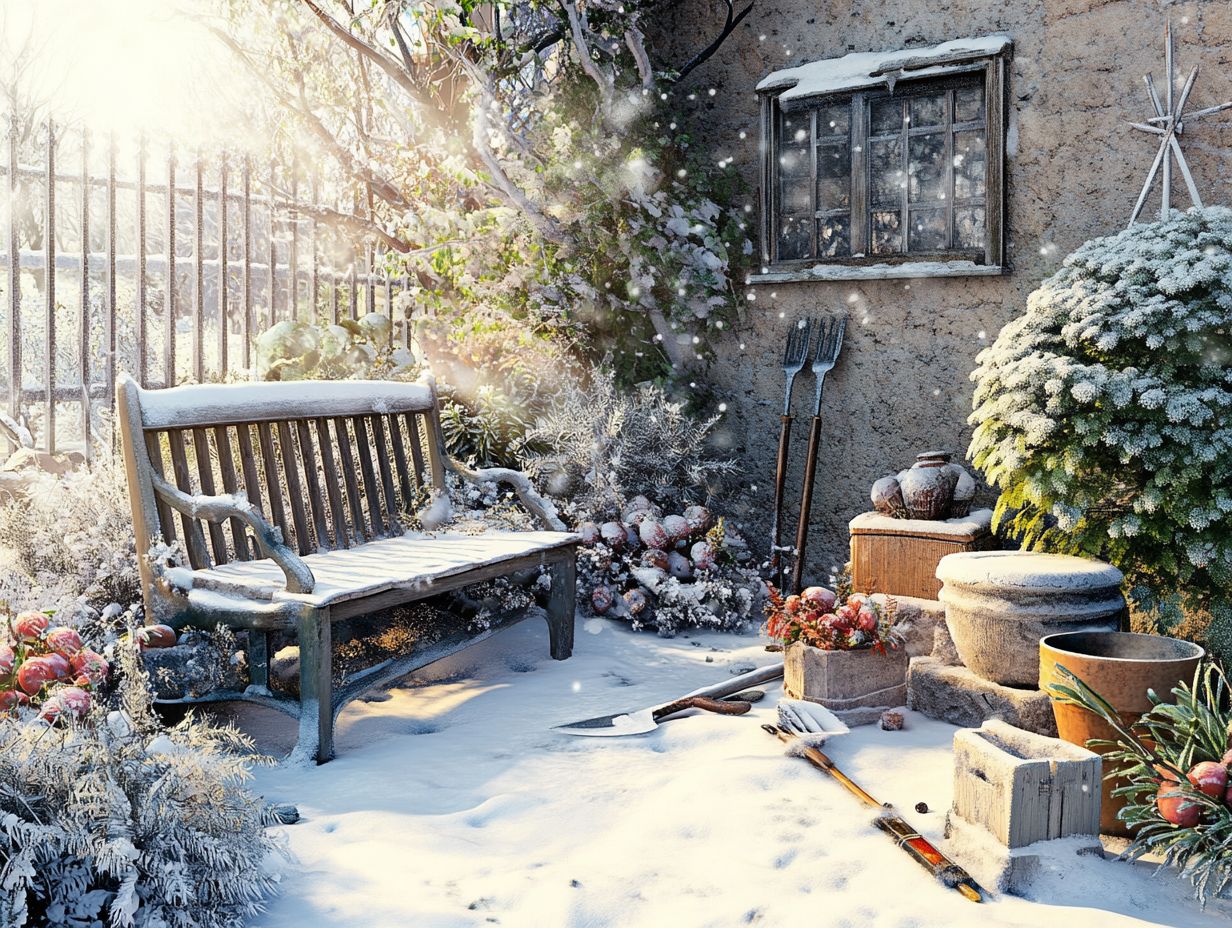
To keep your garden flourishing through the winter months, it s vital to regularly monitor for pests, adjust insulation materials, and ensure your watering schedule is on point. These proactive steps help maintain plant health and maximize your winter harvest.
Implement soil testing to boost the growth and wellbeing of your winter plants. By understanding the nutrient levels in your soil, you can make informed decisions about necessary amendments, ensuring that essential minerals are readily available for your plants.
Regular moisture checks are crucial, as winter conditions can easily disguise moisture levels, leading to potential over or under-watering. Incorporating organic mulch not only provides insulation but also aids in moisture retention, creating a balanced environment for your plants.
By paying attention to these tasks, you’ll cultivate a robust winter garden by selecting plants for a winter garden that stands resilient against seasonal challenges.
Benefits of Winter Gardening
Get excited about winter gardening! It s not just about the harvest; it s about improving your health and connecting with nature. The benefits reach far beyond the mere harvest; they encompass health, sustainability, and an uplifted emotional state. By engaging in winter gardening, you actively promote physical activity, enjoy the bounty of fresh, homegrown produce, and cultivate a deeper connection to nature.
These elements work together to enrich your quality of life during the colder months, making the experience not just rewarding but transformative.
Health Benefits and Sustainability
Health benefits and sustainability are remarkable advantages of winter gardening. By cultivating your own fresh produce, you enhance your diet and champion sustainable practices. Growing your own vegetables decreases the carbon footprint linked to store-bought food, making a positive impact on the environment.
As you tend to a variety of homegrown vegetables, you ll discover a rich source of vitamins, minerals, and antioxidants essential for your overall health. These nutritious choices often outshine their supermarket counterparts, as they are harvested at peak ripeness, bursting with flavor and freshness.
Incorporating sustainable gardening techniques such as composting, changing where you plant different types of vegetables each year, and natural pest control enriches the soil and promotes biodiversity.
These practices nurture a healthier ecosystem and allow you to forge a deeper connection with nature. This connection can improve mental well-being and foster a sense of responsibility as an environmental steward. Winter gardening is not just a hobby; it s a pathway to a healthier you and a thriving planet.
Frequently Asked Questions
What challenges might I face in winter gardening?
Some common challenges include freezing temperatures, lack of sunlight, and depletion of soil nutrients.
How can I protect my winter garden from freezing temperatures?

Protect your garden by using mulch, cloches, or cold frames to trap heat and shield your plants.
What types of vegetables and plants can survive in a winter garden?
Some vegetables that can thrive in winter gardens include kale, spinach, Brussels sprouts, and winter squash. Plants like evergreens and winter-blooming flowers are also great options.
How can I keep my winter garden well-watered during dry winter months?
Use a drip irrigation system or hand-watering to ensure your plants receive enough water. It s also important to check the moisture levels of the soil regularly.
What are some ways to maintain soil health in a winter garden?
You can maintain soil health by adding compost, cover crops, and organic fertilizers during the winter months. Rotating crops helps avoid depleting soil nutrients.
Can I start a winter garden if I live in a colder climate?
Yes, you can start a winter garden in a colder climate. Just prepare and protect your plants from freezing temperatures.
Select cold-tolerant plants, such as kale or carrots. Use row covers to help extend the growing season!
Starting a winter garden can be a rewarding experience! Imagine enjoying fresh vegetables even in the cold months. Don’t miss out on the chance to grow your own food during winter!

